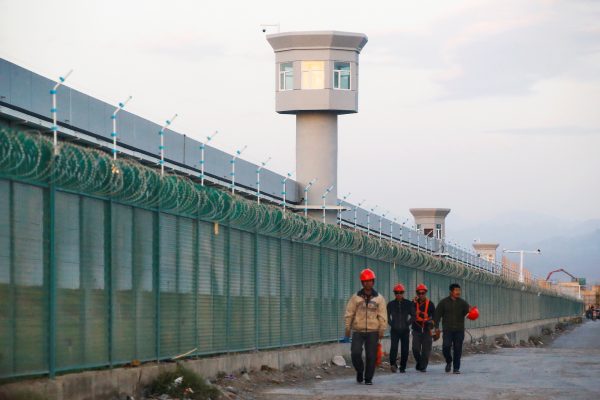Analysis based on Chinese government procurement contracts for the construction of these centres and Google Earth satellite imaging reveals the existence of hundreds of large, prison-like facilities throughout Xinjiang. These are estimated to hold up to 1 million of the region’s Turkic Muslim population.
These facilities resemble prisons with hardened security, barbed wire, guard towers and CCTV cameras. Detainees experience a regimented daily existence, compelled to repeatedly sing ‘patriotic’ songs praising the benevolence of the Chinese Communist Party (CCP) and study Mandarin, Confucian texts and President Xi Jinping’s ‘thought’.
An examination of the operation of this system of mass repression reveals that the CCP’s treatment of the Uyghur population in Xinjiang is animated by governmentality, the politics of exclusion and new surveillance technologies.
Governmentality, as Michel Foucault argued, concerns the problem of government in its broadest sense. For Foucault ‘to govern … is to control the possible field of action of others’. The CCP has long sought to direct the conduct of its citizens in a manner that manages and controls their ‘possible field of action’.
Under President Xi Jinping’s leadership, the CCP seeks to reassert its leading role over the Chinese state and society under a concept of social management that is redolent of governmentality. Social management embodies an effort to optimise government and society in order ‘to improve governance capacity to shape, manage, and respond to social demands’.
Social management combines the CCP’s enduring Leninist drive for control over society with a more recent technocratic desire to ‘harness the power of information technology to tackle the Party’s key challenges’ of ‘maintaining stability, ensuring Chinese Communist Party (CCP) dominance, and preventing organised opposition and enhancing intra-Party discipline’.
Since 2014 the Xinjiang regional government has systematically implemented a digitally-powered totalitarianism that combines long-standing practices of ‘collective, face-to-face’ supervision with technological innovation in the name of security and stability.
Here, the roll-out of so-called ‘grid management’ — whereby major urban and rural centres are divided ‘into geometric grids’ and ‘placed under the control of a grid captain and a host of security officials who are personally responsible for upholding stability and harmony’ — has taken place in tandem with a ‘blue sky’ technological surveillance architecture characterised by the use of facial recognition and iris scanners at checkpoints, train stations and gas stations, collection of biometric data for passports, and mandatory apps to cleanse smartphones of subversive material.
The data collected is then aggregated by an app used by security personnel, the Integrated Joint Operations Platform (IJOP), to report ‘on activities or circumstances deemed suspicious’ and to prompt ‘investigations of people the system flags as problematic’.
The final animating factor driving this endeavour is the CCP’s construction of a Schmittian politics of exclusion.
Carl Schmitt argued that the essence of the political was the ‘friend/enemy distinction’. For Schmitt the key task for actors was ‘to deal with its inevitability’. Schmitt’s core claim is that only by making the ‘friend/enemy distinction’ may we achieve clarity about who ‘we’ are and what it is that is rational for ‘us’ to do.
The CCP has long engaged in the politics of exclusion. Under Mao Zedong’s rule, this hinged on class distinctions and informed the creation of a system of extra-judicial labour camps in the 1950s for class ‘enemies’ where the objective was to ‘transform’ the prisoner and achieve their ‘reform’ and rehabilitation.
In contemporary Xinjiang, the coercive politics of exclusion has been revived in the re-education or vocational training centres. As Sean Roberts has noted, the CCP’s approach is no longer framed by class distinction but rather by a bio-political one where Uyghurs are conceived of as a ‘virtual biological threat to the body of society’. Government officials describe Uyghur ‘extremism and terrorism’ as a ‘tumour’ to be excised from society; the CCP’s discourse and practice toward the Uyghur people is defined by the language of pathology.
The state uses the friend/enemy distinction to justify detention, re-education and legal restrictions on religious practices. The objective arguably is to compel Uyghurs to turn away from central markers of their own ethnic identity — the Uyghur language and Islam — in order to, in President Xi’s words, ‘enhance their sense of identity with the motherland, the Chinese nation, Chinese culture, the CCP and socialism with Chinese characteristics’.
The implementation of the CCP’s new technologies of power and social management in Xinjiang is framed by a clear ‘friend/enemy distinction’. This gives the state clarity regarding ‘the way in which the conduct of individuals or of groups might be directed’ and clarity in Schmittian terms about what is to be done to resolve the distinction.
Michael Clarke is Associate Professor at the National Security College, the Australian National University.


As the proverb says : every coin has two sides.We must know the whole truth.Why not get some information from the UN’ visit to Xinjiang.